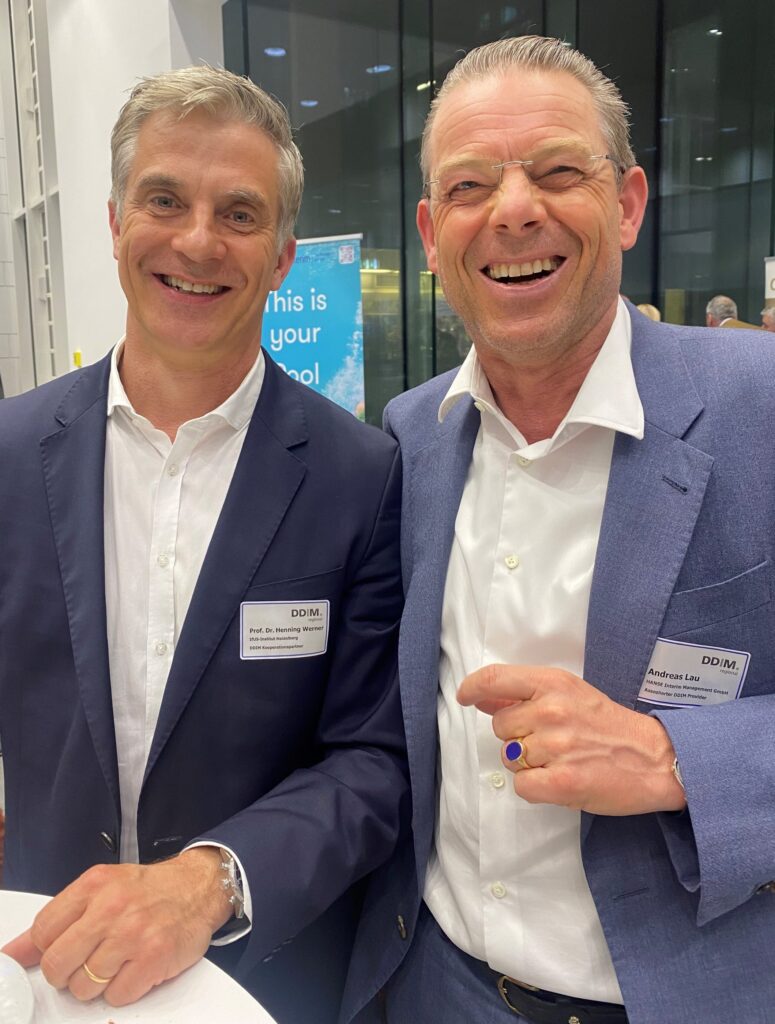“If you don’t move with the times, you move with the times” – the motto of Hanse Interim for over 20 years.
New German: “If you don’t transform, you will be restructured” – the introductory bon mot by Prof. Dr. Henning Werner, Professor at the IFUS Institute for Transformation, Restructuring & Reorganization on April 4, 2024, at DDIM.regional // Munich in cooperation with the IfUS Institut für Unternehmenssanierung.
The topic of the event was “Mastering transformation & turnaround – areas of application for interim managers”. Andreas Lau, our Managing Director at HANSE Interim, was one of the participants in the discussion.
In view of Germany’s shrinking economic growth, the rising number of corporate insolvencies and increasing job losses, restructuring cases are on the rise. In such a phase, there are good prospects for restructuring mandates for interim managers.
As a restructuring or transformation expert, the interim manager can provide valuable impetus in such a situation and manage and help implement the change process.
Eckhart Hörner-Marass, interim manager and DDIM member, gave an interesting keynote speech about his experiences and successes in managing restructuring projects. He presented best practices and strategies for his typical approach to a CRO mandate. And Oliver Emmerich, Wieselhuber & Partner, presented a case study of a successful transformation.
In the subsequent panel discussion, the use of interim managers as Chief Restructuring Officer (CRO) in restructuring and as Chief Transformation Officer (CTO) in transformation was discussed in a differentiated manner, with the audience involved.
Another interesting question was whether the interim CRO is also the ideal CTO. Prof. Dr. Werner summarized this question by referring to the institute’s latest study “Chief Transformation Officer (CTO) – Game changer for a successful transformation?”.

The quintessence of CRO expertise: experience, mediation and track record
In over 20 years, we at HANSE Interim have gained a wealth of experience that has made us experts in the field of restructuring. Since 1998, Andreas Lau has restructured around 200 companies from a wide range of industries himself or assessed and managed their restructuring capability and feasibility with and without interim managers. Over the years, we have gotten to know more than a hundred CROs and many who call themselves such. We have come to know many who have restructuring on their CV, but on closer inspection we learn that restructuring is often meant with “the liquid parent behind them”. While restructuring “when cash is tight” requires completely different expertise from a CRO. This needs to be differentiated when making a selection. And at least as important: the agent selecting a CRO must absolutely understand the business model of the company to be restructured in order to classify the CRO’s necessary specialist skills for the client’s turnaround.
At HANSE Interim, we use our expertise to do just that.
Success factors for CROs in restructuring processes
Holistic diagnosis and root cause analysis: A successful CRO must be able to carry out a comprehensive diagnosis of the company’s financial, operational and strategic challenges. This requires a thorough root cause analysis in order to identify the root of the problems and develop suitable solutions. If the analysis results and package of measures are already available as a restructuring report from a team of consultants, the CRO must be able to adapt them and understand that this restructuring implementation will be financed. He is welcome to take up and contribute further impulses and ideas for increasing earnings from day-to-day business, but he must understand how to incorporate these into the specified restructuring path in the restructuring team with the correct prioritization.
Ability to act quickly and effectively: Time is often a critical factor in restructuring situations. A successful CRO must be able to act quickly and take decisive action to get the company back on track and restore financial stability.
Restructuring planning and implementation: A detailed restructuring plan is essential to the success of a turnaround. The CRO must be able to develop a clear plan that includes both short-term and long-term goals and measures, and implement this plan effectively.
Communication and stakeholder management: During a turnaround, it is crucial to keep the company’s various stakeholders, including financiers, employees, employee representatives, suppliers, customers, creditors, investors and advisors, properly informed and involved. A successful CRO must have excellent communication skills to build trust and gain support for the turnaround process.
Talent management and employee engagement: Employees are a critical success factor in the implementation of a turnaround. A successful CRO must be able to build a strong team, motivate and support employees to achieve the turnaround goals together.
Continuous monitoring and adjustment: The restructuring of a company is an iterative process that requires continuous monitoring and adjustment. A successful CRO must be able to monitor progress, respond to changes and adjust the turnaround plan as needed.
Ultimately, our strength lies in the fact that we not only have or find very competent CROs, but also have a deep understanding of restructuring that helps us to offer our clients tailor-made solutions. At HANSE Interim, we stand for professionalism, competence and success in the world of restructuring.
By the way: CROs are in short supply! In our most recent search for a medium-sized mechanical engineering company with several plants in Europe and a good thousand employees, just five percent of our CROs were even available.
Good thing we have over a hundred to choose from.
With kind regards
Your HANSE Interim Management
Andreas Lau


